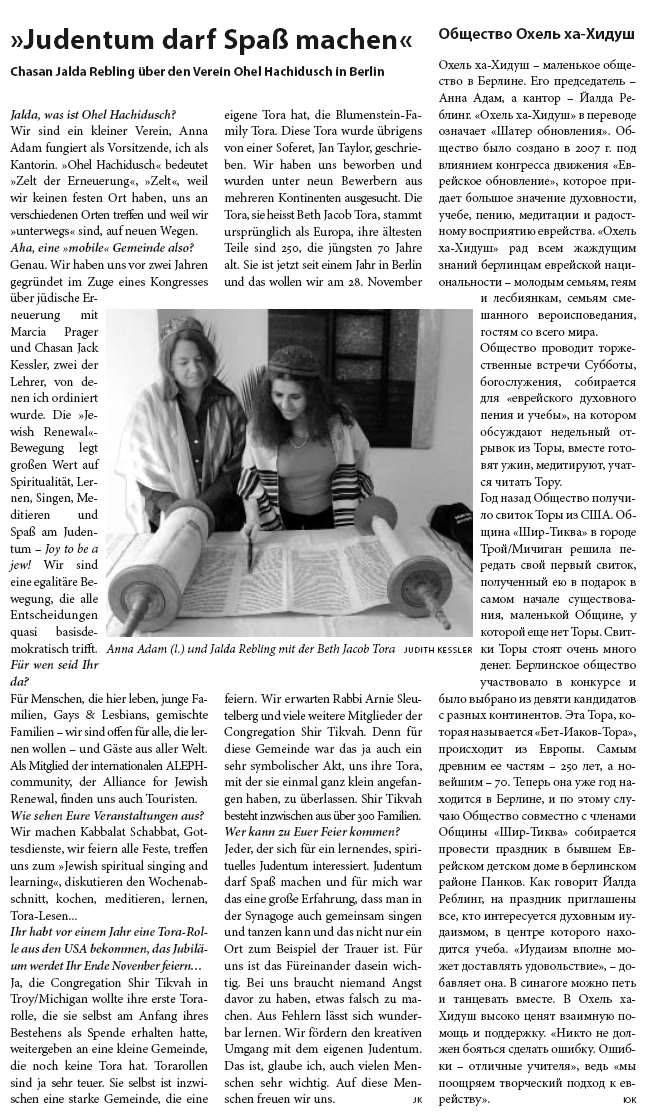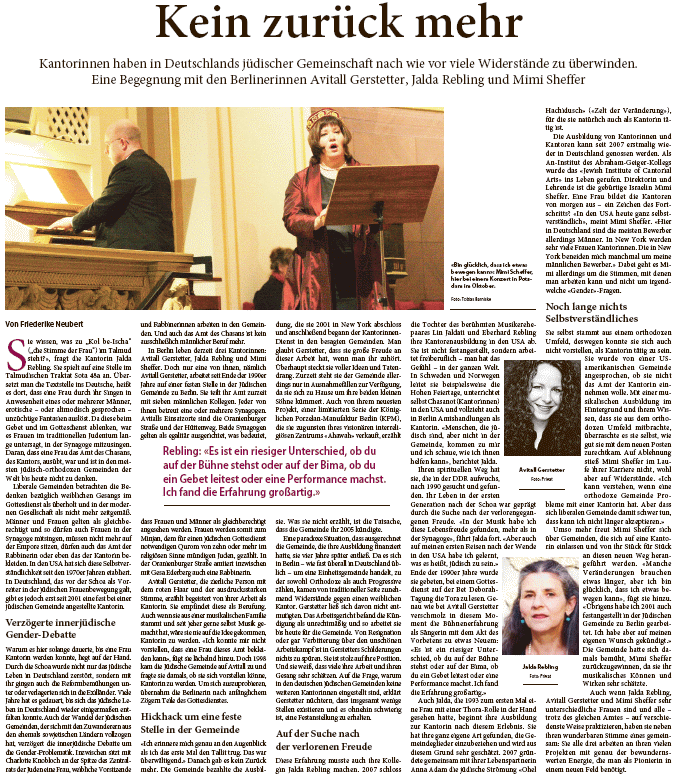
MEDIA
The Conservative Movement must endorse equal same sex marriage ceremonies
"The Philadelphia Jewish Voice: Hanukkah Miracles: Germany"
Rabbi Dr. Goldie Milgram, January 2012
"Deutschlandradio Kultur: Eine ungewöhnliche Gemeinde in Berlin"
Radiobeitrag von Gerald Beyrodt, November 2011 (german)
"Die Rolle aus Amerika", Article Jüdische Allgemeine, December 3, 2009 (german)
"Der Verein Ohel Hachidusch", Article Jüdisches Berlin, November 2009 (german)
"Kein zurück mehr", Article Jüdische Zeitung No. 46, page 17, December 2009 (german)
Bau einer Ohel-Sukka (german)
Shabbat Behalotecha
"Frauen auf dem Weg", Article Jüdische Allgemeine, 17. Mai 2007 (german)
1. Ohel Hachidush Conference by Rabbi Marcia Prager
Jüdische Erneuerung in Europa Sarah Ross for AVIVA-Berlin (german)
The Conservative Movement must endorse equal same sex marriage ceremonies
It is in the media:
April 2012 the Israeli Conservative Movement approved ordination of gay rabbis which in the American branch of the organization is customary since several years. And Schechter Rabbinical Seminary in Jerusalem which is affiliated with the Conservative Movement will admit gay and lesbian students as of the upcoming year.
Furthermore: May 31, 2012 the Rabbinical Assembly´s Committee on Jewish Law and Standards of the Conservative Movement approved new guidelines for their rabbis on performing same-sex wedding ceremonies. The vote was unanimously (13:0 with one abstaining ballot).
For details and further links please check the following link:
http://www.haaretz.com/opinion/the-conservative-movement-must-endorse-equal-same-sex-marriage.premium-1.435717
This news was overdue. Ohel Hachidusch received it with a feeling of great relief since years ago these problems caused a lot of irritations and hurt in Berlin.
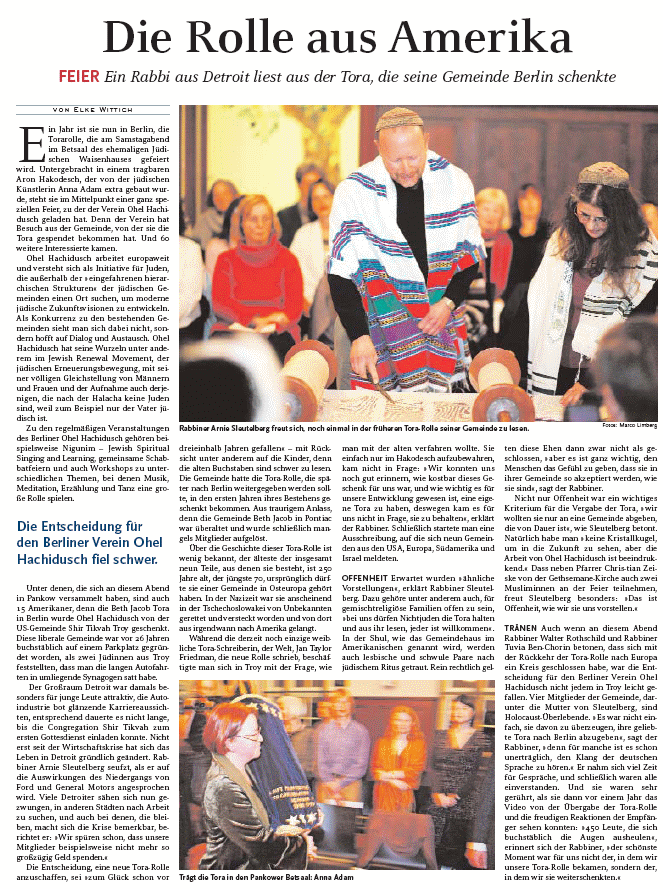
Bau einer Ohel-Sukka

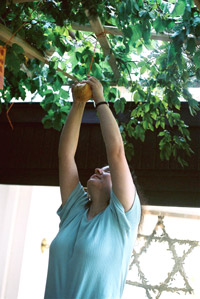
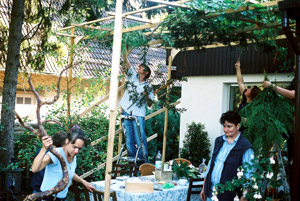
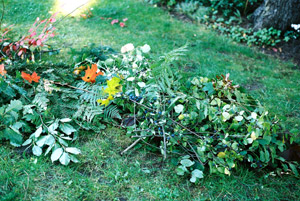
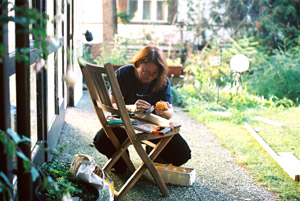
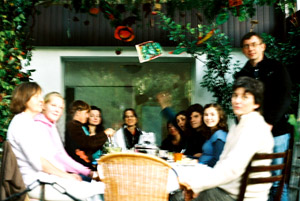
Am Tag nach Jom Kippur begannen wir sofort mit dem Bau der Sukka. Wir haben unter Annas professioneller Anleitung den ganzen Tag gebaut, Äste und Früchte im Wald gesammelt mit denen wir unsere Sukka schmückten. Unsere Ohel-Sukka hat uns und viele Gäste beherbergt, wir haben gut gegessen und uns daran erinnert, dass wir alle unterwegs sind in dieser Welt, so wie unsere Mütter und Väter in biblischen Zeiten unterwegs waren.
For Shabbat Behalotecha
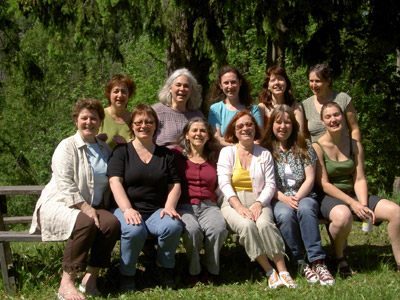
13 women gathered at a holiday house owned by the Jewish community of
Oslo to experience Shabbat. The women filled all roles; from cooking to
davvening leadership and Tora leyning. A gathering such as this could
not have been possible without volunteer participants to help plan,
cook, set the space and organize practical matters before and during
Shabbat. Sharing the practical work added to the sense of community.
This was the second gathering of its kind in Norway, a country where
there are less than 2000 Jews and where the two only synagogues (one in
Oslo and one in Trondheim) are orthodox, meaning that women always
participate from the women's section or gallery during synagogue
services.
The weekend was initiated by rabbinical student Lynn Claire Feinberg
and co-led by Hazzan Jalda Rebling both educated under Aleph - Jewish
Renewal.
The women came from a broad spectrum of Jewish backgrounds; from modern
orthodox to identifying as cultural or traditional Jews, some active
members of the established community, others not belonging to any
community, some always having known they were Jewish, others having
become Jewish or learned about their being Jewish at a later age. Some
were well versed in following a traditional service and understood
Hebrew, others could not even read Hebrew, much less understand. This
diversity in relationship to what it means to be Jewish was an exciting
element in all the discussions and sharing that emerged and helped
bring new understanding to what it might mean to be a Jewish woman of
today.
The three services; Kabbalat Shabbat, Shabbes Shacharit and Shabbes
Mincha created a container for the gathering. Beginning Friday evening
with singing Shirey b'erev Shabbat; the niggunim and melodies used for
Kabbalat Shabbat before kindling the Shabbat candles at 20:20 pm and
ending with Havdalah at 1:15am Sunday morning (as is the rabbinical
ruling during summer when the sun hardly sets this far north) and made
this a Shabbes with plenty of time for recreation and recharging the
soul. This was a Shabbes full of song, prayer, deep sharing, laughter,
good food and time to be each other's company.
In order to even make it possible for those who were not able to read Hebrew to follow the service, Lynn Claire Feinberg had prepared a Siddur that in addition to the Hebrew text was translated and transliterated into Norwegian. This Siddur, modeled from Siddurim created by the Renewal and Reconstructionist movements, is the first Siddur of its kind in Norwegian.
In order to lead services that could be accepted within an
orthodox framework certain key parts of the service such as Barchu and
Kaddish had to be omitted, paying respect to the fact that from an
orthodox perspective a gathering consisting only of women cannot be
called a Minjan. Thanks to the training both Jalda and Lynn share from
learning Davvening Leadership and having participated at many
innovative services led by fellow students and teachers, this
restriction did not make the services feel less authentic. Alternative
texts in English were sung instead of Barchu, and "Ana El Na Refa Na
la", in place of Kaddish Yatom. Before and after reading Torah
alternative texts used by orthodox women in Jerusalem were used. These
texts actually proved to be more beautiful than the traditional
blessings. With only women participating it felt more appropriate to
have services that were somewhat different from the traditional. This
fact made the Renewal elements in the services feel more natural than
they might have, had the aim been to make a fully traditional service.
The use of group aliyot to the Torah added to this experience. In
general, Jalda's firm experience as a cantor helped bind the different
parts of the service together, combining traditional nussach with
familiar and less familiar melodies. With guiding words Lynn helped
open to a deeper understanding of the service. With an experienced
Gabbai and Haftara reader Arna Desser, originally from Baltimore, now
living in Oslo among us, the Torah service became a worthy centre piece
in the morning and afternoon services. This Shabbat weekend was
trans-denominational in a very real sense of the word.
Comments from participants after the week-end;
A great pleasure to experience and partake in a community of Jewish
women. The setting gave space for laughter and sharing at a gut level,
a sharing between Jewish women that is rare. It felt liberating to have
a community experience with room for both religious expression through
services and song, yet with enough space for sharing on a more mundane
level. The space was able to contain a plurality of expressions that
included women from different religious stances, with different ages,
and different backgrounds. The setting gave everyone a space from which
to honour their own boundaries; some did not want to touch the Torah
nor try on a Tallit, whilst others did, yet everyone felt included and
a part of the community. This was no "charter trip", but an adventure
where one could be on a personal journey together. The weekend managed
to convey the main teaching of what Shabbat is; a time for joy and
pleasure in community. For some it was important that the boundaries of
orthodoxy as defined by the Rabbi of the Jewish Communities of Norway
had been respected, signifying that to partake in a weekend such as
this does not mean the same as being in opposition to the existing
community. This way of celebrating Shabbat could in theory be
acceptable for all Jewish women in Norway or Scandinavia without them
having to fear it being against orthodox Halakha. With the openness
that was present the women experienced a space where it was possible to
talk openly about Jewish issues from both a religious as well as a non
religious perspective. Many expressed the joy of having experienced
spirituality in a Jewish context. All the music and song reached in,
and made room for spiritual openings. The music in the services opened
spiritually on a deep level even without understanding Hebrew.
The weekend gave a good balance between structure and time to shmooze,
between teachings and services and time to get to know each other, time
to rest and recreation - this added to the experience of making this a
very special Shabbat and as one participant put it at 1.20 am Sunday
morning; that this was the greatest Havdalah she had ever experienced!
All the women expressed that they really would love to come back for a
similar experience next year.
Jalda's expertise helped give a deep cantorial experience and the Tora service gave the Shabbat an extra dimension. Its presence created a special and dignified frame around the services and contributed to add to the experience of the Shekhina's presence. The way Jalda shared songs, and her unique way of teaching made the songs a part of us even before we realized it.
Lynn's open and including perspective in regards to what it means to be Jewish and what shabbes is about created a "container"/(environment) that was both safe and open at the same time. It is enriching that Lynn has initiated this kind of a journey for us and others to travel. With a journey such as this Lynn creates a place where Jewish souls can meet.Hazzan Jalda Rebling is ordained as chazzan (kantor) through Aleph Jewish Renewal. With her many years of experience as a Jewish storyteller, singer and actress and a teacher of Jewish culture she has a wide knowledge from which she can share and make Judaism come alive. During the last years she has been responsible for training two minjanim (prayer groups) in Germany where she lives. She is the main responsible person in forming the European Jewish Network, Ohel Hachidusch; www.ohel-hachidusch.org an organisation from where to teach, develop and express Judaism and Jewish culture for all who for different reasons do not feel at home in traditional communities or for those who seek Jewish experiences and learning beyond what the traditional communities are able to offer. She will soon begin a training course in davvening (jewish prayer) leadership in Europe.
Chief responsible for the weekend is Lynn Claire Feinberg from Oslo, a rabbinical student under Aleph Jewish Renewal. As a part of this education she had participated in a two year program in davvening leadership and has a certificate as an Eco-kosher Masgiach (overseer of kashrut). She is an Historian of Religion having specialized in Women and Judaism and is also trained as an Astrologer. She teaches a variety of Jewish themes and is presently engaged in creating texts and material to be used at the Jewish Museum in Oslo as it is being established. As a specialization within the rabbinical program she is training to become a mashpiah - a Spiritual Director.
Aleph Jewish Renewal in USA is a movement that aims at bridging all Jewish paths and denominations and to promote Judaism as a living tradition and tool for inner growth and social action in the 21 century. As Jews we are facing changes that are as vast as the ones that happened after the fall of the 2. temple and the rise of Rabbinical Judaism 2000 years ago. An important part of the renewal of today is women having more visible roles as spiritual leaders and creators of ritual space. Since the circumstances of Jews living in Europe are different than in the USA, Ohel Hachidusch has been created as a vehicle for this kind of change in Europe.
"Frauen auf dem Weg"
Artikel Jüdische Allgemeine, 17. Mai 2007
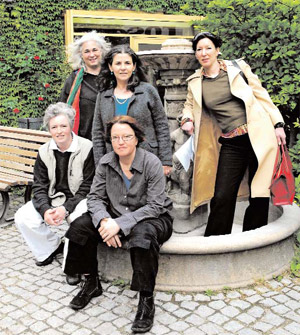
Trafen sich im „Zelt der Erneuerung“: (stehend v. l.) Lynn Feinberg, Jalda Rebling, Sharon Adler,
(sitzend v. l.) Caroline Krings-Lazowsky und Anna Adam.
> Link zum PDF Artikel Jüdische Allgemeine
1. Ohel Hachidush Conference
Philadelphia Rabbi Marcia Prager and Cantor Jack Kessler are invited to
Berlin Germany for the Ohel HaChidush Conference: Inspiring a Renewal of German
and European Jewish Spiritual Life
From May 10-13 in Berlin, Germany, a group of 50 Jewish men and women from Germany and diverse cities in Europe gathered at the famous Oranienburger Strasse Synagogue for the first international initiative of Ohel Hachidush: The Tent of Renewal: a new movement for Jewish learning, celebration, prayer and reclamation of Jewish Identity in Germany and Europe.
The event was organized in cooperation with the Berlin Jewish Adults Education and the Synagogue Oranienburger Strasse Bejt Or and their Rabbi Gesa Ederberg. Participants came from the Netherlands, Norway, Italy and all over Germany.
"Jews in Berlin need more opportunities for creativity and experimentation in their Jewish religious expression," said Cantor Jalda Rebling, who co-created this event with a dedicated group of Jewish teachers and activists influenced by the American Jewish renewal movement. That is why they invited leaders of the U.S. based movement to present a Thursday through Sunday teach-in and Shabbaton for Jews in Germany's capital.
Rabbi Marcia Prager and Cantor Jack Kessler of Philadelphia flew into Berlin to offer a taste of Jewish renewal and explore with conference participants what a uniquely European style of renewal might look like. Rabbi Prager and Cantor Kessler led a series of intensive workshops, a song-filled renewal-style Kabbalat Shabbat with Cantor Rebling, and co-led with Cantor Avital Gerstetter and Cantor Rebling in a traditional Shabbat morning service at the conference.
The Conference also included European teachers offering diverse workshops such as "Women and Talit" led by Lilith Schlesinger. Prof Ilan Tal of the Freie Universität Berlin gave a Talmud study on Masekhet Bavli Taanit as an example of feminist commentary on the Babylonian Talmud. Sandra Lustig discussed her book 'Turning the Kaleidoscope: New Perspectives on European Jewry' and Professor Susanne Zeller discussed new approaches to Jewish Social Work.
Said Cantor Rebling; "This conference supports Jewish renewal projects throughout Europe. Here in Berlin, for instance, Ohel HaChidush is becoming a place where young Jewish people and also their elders can come together to learn, sing, create, cook together, and share joy ands sorrow of our lives. Every Jew is welcome, especially those who cannot find their place in the traditional Jewish communities. Some who find a welcome at Ohel HaChidush are living in unusual family structures; some have had very few experiences in living as a Jew; some have a Jewish father but not a Jewish mother. All are looking for a space where they are accepted as they are."
An international network is growing and was represented at the conference. Participants from several European countries attended. ALEPH Alliance for Jewish Renewal rabbinical student Lynn Feinberg from Oslo, a co-creator of this group, came to the conference to teach Eco-Kashrut: an expansion of the traditional concept of keeping kosher that integrates an array of ecological concerns. German born Rabbi Elisa Klapheck, who is serving as rabbi in Amsterdam and is one of the renewal pioneers in Europe, wrote a moving opening address to the conference in which she called upon those who attended to "create our own way of renewal because of our unique German and European history."
Cantor Rebling, whose mother survived Auschwitz and Bergen-Belsen said: "Every European Jewish life story is a story of a broken family tradition. For many of us in the post-Shoa (Holocaust) generation, to be a Jew still means to be full of sorrow, pain and loss. Many Jews in Germany still have ambivalence and anxiety about creating new roots in this country. We wonder if it is possible to find new joy in being a Jew in Germany or in Europe.
Learning, spirituality, good music and good food certainly made the three days of the conference an event of joy, hope and creativity. This weekend brought Jews together, consolidated an international network, and made it obvious that the time for Jewish renewal in Europe has arrived.
At the close of Shabbat, a Havdala ceremony with about 100 participants became a special event because the three German female cantors of Germany, Avital Gerstetter, Jalda Rebling and Mimi Sheffer, came together in an unforgettable concert. Cantors Jalda Rebling and Jack Kessler also shared wonderful Sephardic music with the audience accompanied by the famous percussionist Michael Metzler.
Said Manja Pach from Deventer (Netherlands): "What an inspiring group! I
never thought that I could find a place for me and my ideas. I am so happy that I
came.
Rabbi Marcia Prager
Jüdische Erneuerung in Europa
Vom 10.-13. Mai 2007 fand der erste Kongress von Ohel Hachidusch in
Berlin statt, einer europäisch-jüdischen Initiative, die
richtungsübergreifend einen Weg in die Moderne sucht.
Einen Ort, wo Juden und Jüdinnen "einfach nur jüdisch sein" können hat die europäische Initiative Ohel Hachidusch am vergangenen Wochenende in der Stiftung Neue Synagoge Berlin - Centrum Judaicum für einige Tage geschaffen. Vom 10. bis 13. Mai 2007 fand dort der erste Kongress von Ohel Hachidusch statt, der unter dem Motto "Visionen - Erneuerung - Renewal" stand. Gemeinsam mit Rabbi Marcia Prager und Chasan Jack Kessler von der amerikanischen Organisation ALEPH - der Alliance for Jewish Renewal - haben die Berliner Schauspielerin und Kantorin Jalda Rebling und die Künstlerin Anna Adam einen bedeutenden Schritt für das deutsche, beziehungsweise europäische Judentum gewagt.
Trotz, und gerade aufgrund, der "eingefahrenen hierarchischen Strukturen"
in den deutschen Gemeinden, haben sie die Initiative ergriffen und
einen Raum geschaffen, in dem alle Juden, die keinen Zugang mehr, oder
noch keinen Zugang zu den bestehenden Gemeinden haben, ihren Platz
finden können. Sie bieten einen Ort für jüdische
Visionen, für Kreativität, Diskussionen, Feste, Musik und
Spiritualität. Kurz: einen Ort für IndividualistInnen.
Dabei will Ohel Hachidusch jedoch keine neue Gemeinde gründen,
sondern vielmehr in den Dialog treten mit den bereits bestehenden
jüdischen Gemeinden und mit Limmud-Deutschland.
Besonders in seiner Philosophie lehnt sich die richtungsübergreifende Initiative an die amerikanische Jewish Renewal Movement (die jüdische Erneuerungsbewegung) an. Ihr Weg zur Erneuerung im Judentum führt u.a. über eine zeitgemäße Exegese der jüdischen Schriften, sowie generell über neue Zugänge zur jüdischen Tradition, wobei auch Elemente der jüdischen Mystik und des Chassidismus eine bedeutende Rolle spielen. In diesem Zusammenhang setzt die Erneuerungs-Bewegung vor allem den, dem Judentum immanenten, stetigen Prozess des Wandels fort, den Rabbiner Zalman Schachter-Shalomi, der Begründer der Renewal Movement, mit dem so genannten "Paradigm Shift" bezeichnet hat. Was jedoch in den USA natürlich gewachsen ist, muss in Europa - aufgrund des Holocausts - erst "aus dem Nichts" erbaut werden, wie Jalda Rebling in ihrer Eröffnungsansprache erklärte. In diesem Zusammenhang stellte Rabbinerin Elisa Klapheck in einem Grußwort an Ohel Hachidusch zurecht die Frage, welcher Gestalt die jüdische Erneuerung in Europa sein kann, und was man aus den USA lernen kann. In einem waren sich sowohl die VeranstalterInnen wie auch die TeilnehmerInnen des Kongresses einig: Ziel und Zweck der jüdischen Erneuerung in Europa soll sein, Juden und Jüdinnen die Möglichkeit zur Rückkehr zum Judentum zu geben und die Freude im Judentum wiederzufinden. Schlicht "maximal Judaism" erleben und leben, wie Rabbinerin Marcia Prager in ihrer Eröffnungssession erklärte.
Ein Hauptmerkmal der Jewish Renewal Movement ist der "fully egalitarian way of Jewish life",
in dem vor allem Männer und Frauen völlige Gleichberechtigung
erfahren und auch diejenigen in die Gemeinschaft aufgenommen werden,
die am Rande des Judentums stehen (wie beispielsweise die so genannten
"Vaterjuden"). Diese und andere Themen wurden in kleineren
Gesprächskreisen, aber auch in einer umfangreichen Auswahl an
Workshops und Diskussionsrunden thematisiert. So gab es
Diskussionsbeiträge zu "Mesekhet Bavli Ta'anit als ein Beispiel
für einen feministischen Kommentar des Babylonischen Talmuds" von Prof Tal Ilan (FU Berlin), zu "Frauen und Tallit" mit Lilith Schlesinger (Berlin), zum Thema Ökologie (Eco-Kashrut) mit Lynn Feinberg aus Oslo sowie eine Diskussionsrunde unter der Leitung von Sandra Lustig (Berlin) zu ihrem neuen Buch "Turning the Kaleidoscope - Persepectives on European Jewry".
Rabbinerin Marcia Prager aus Philadelphia und Chasan Jack Kessler,
Direktor des ALEPH Cantorial Programs (Philadelphia, USA) gaben jeweils
eine fundierte Einführung in "The Four Worlds of Jewish Renewal" und zu "Spiritual Singing and the Treasures of Traditional Nussach".
Seinen Höhepunkt fand der Kongress in der öffentlichen Hawdala (der Verabschiedung des Schabbat) am Samstagabend mit anschließendem Konzert. Neben Kantor Jack Kessler, in Begleitung von Michael Metzler (Percussion), standen erstmals alle drei Berliner Kantorinnen, Mimi Sheffer, Avital Gerstetter und Jalda Rebling gemeinsam auf der Bühne - im Festsaal des Cenrtum Judaicum, der ehemaligen Frauengalerie der Neuen Synagoge Berlin.
Zum Kongress von Ohle Hachidusch haben sich Menschen aus Deutschland, Holland, Norwegen, den USA und anderen Orten zusammengefunden. Sie kamen aus Neugier oder weil der Zufall sie zu Ohel Hachidusch führte. So unterschiedlich die Lebensgeschichten der einzelnen TeilnehmerInnen auch waren, eines hatten sie gemeinsam: Bei Ohel Hachidusch haben sie Dinge gefunden, die sie im Judentum oder in ihren Gemeinden immer vermisst haben: Worte wie "Ich muss nur ich sein, niemand lähmt mich", "Komm und bring alles mit, was Du gelernt hast und was Dich ausmacht" oder "Ich bin Heim gekommen", spiegeln deutlich den Erfolg des Kongresses wider.
Dennoch gab es auch skeptische Stimmen: Fragen wie "Was soll in einer undefinierten Umgebung erneuert werden" oder "Wie soll Ohel Hachidusch langfristig tragfähig sein" wurden zu Recht gestellt. Nichtsdestotrotz hat Ohel Hachidusch ein Bewusstsein dafür geschaffen, dass das Judentum von seinen Menschen getragen und erhalten wird, dass man in Integrität miteinander leben und arbeiten muss, um zukünftig ein erneuertes Judentum in Europa etablieren zu können. So schrieb Rabbinerin Elisa Klapheck in ihrem Brief an die Initiative: "Es ist mein Traum, dass von Berlin die jüdische Erneuerung ausgeht."
Der Kongress wurde in Zusammenarbeit mit der Jüdischen
Volkshochschule Berlin und der Synagoge Oranienburger Straße Bejt
Or Berlin durchgeführt.
Autorin: Sarah Ross für AVIVA-Berlin
